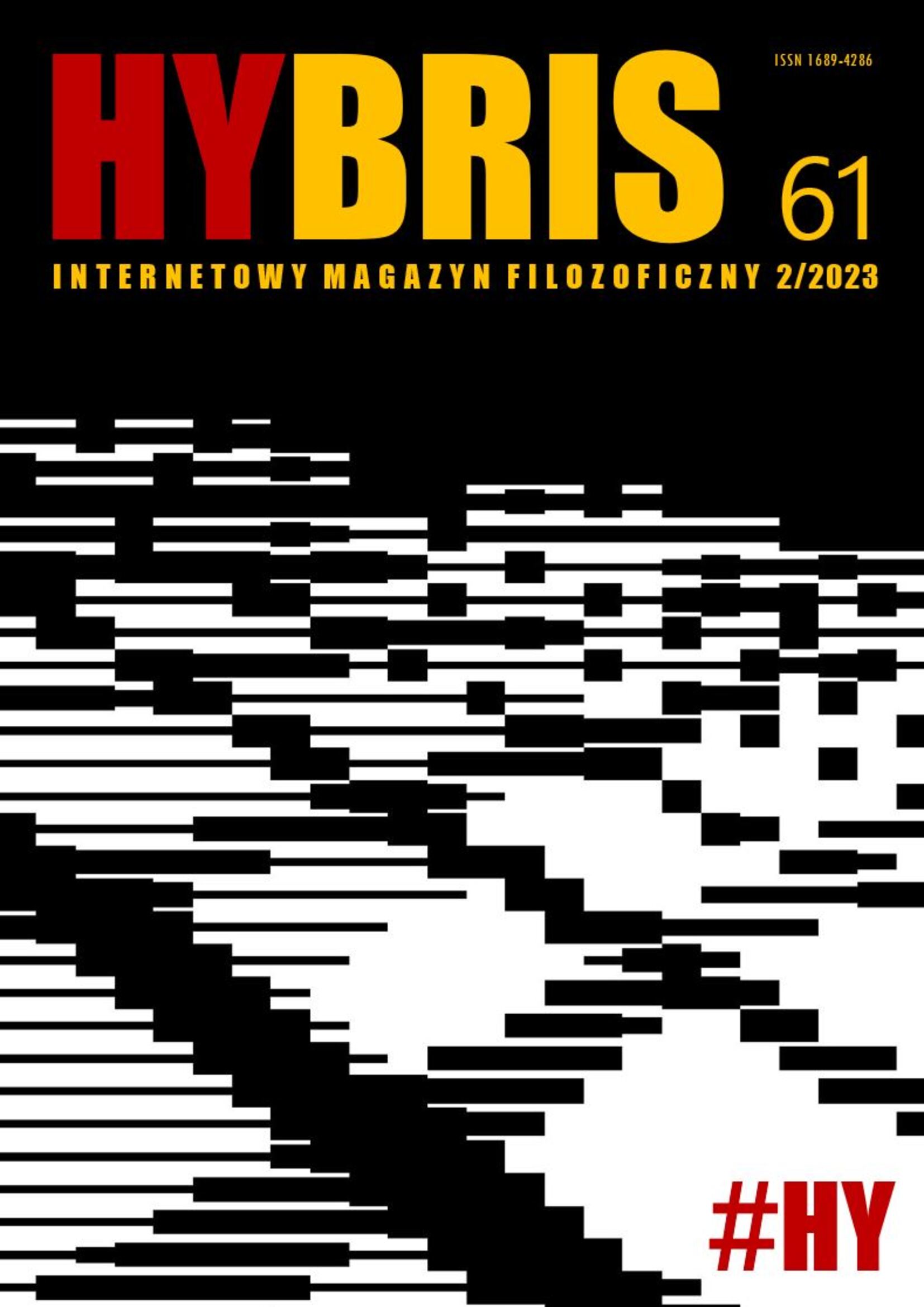The Return to Rousseau: the “Failure” of Emancipation and “Breakdown of the Work”? Some Critical Remarks on Paweł Pieniążek’s “The Individual, Evil and History in Rousseau’s Thought”
DOI:
https://doi.org/10.18778/1689-4286.61.04Keywords:
Rousseau, Paweł Pieniążek, polemics, emancipation, failure, individualism, citizen, solitude, conflictAbstract
The paper presents polemical remarks on Paweł Pieniążek’s study entitled Jednostka, zło, historia w myśli Rousseau (The Individual, Evil, History in Rousseau’s Thought, Łódź 2022). An attempt is made to discuss with the Author the interpretation of Rousseau’s main works, his most important concepts and theoretical problems. In particular, Social Contract, Emile, Reveries of the Solitary Walker, Julie, or The New Heloise are analyzed, but there also appear key references to the so-called first and second Discourses, Dialogues and Letters to Malesherbes. Where Pieniążek sees only evidence of the “failure” of Rousseau’s emancipatory ideals and signs of the “breakdown” of his work, the author of the polemic tries to defend the “citizen of Geneva”, showing that there are alternative ways of reading Rousseau’s texts, which allow him to be protected from the traditional allegations that he failed completely to reconcile the communal and individualist plan of his thought and remained dramatically torn between the two contradictory and self-excluding ideals: the citizen and the solitary.
References
Gourevitch, V. (2012). A Provisional Reading of Rousseau’s „Reveries of the Solitary Walker”. The Review of Politics, 74/3, 489518. https://doi.org/10.1017/S003467051200054X
View in Google Scholar
DOI: https://doi.org/10.1017/S003467051200054X
Hölderlin, F. (2003). Wędrówka, Ren. W: idem, Co się ostaje, ustanawiają poeci. Przeł. A. Libera. Kraków: Znak.
View in Google Scholar
Iheoma, E.O. (1997). Rousseau’s Views on Teaching. The Journal of Educational Thought / Revue de la Pensée Éducative, 31/1, 6981.
View in Google Scholar
Kain, P.J. (1990). Rousseau, the General Will, and Individual Liberty. History of Philosophy Quarterly, 7/3, 315334.
View in Google Scholar
Marks, J. (2001). Jean-Jacques Rousseau, Michael Sandel and the Politics of Transparency. Polity, 33/4, 619642. https://doi.org/10.2307/3235519
View in Google Scholar
DOI: https://doi.org/10.2307/3235519
Markowski, M.P. (2005). Spektakularna spekulacja. Literatura na Świecie, 9–10, 363380.
View in Google Scholar
Neidleman, J. (2013). Rousseau and the Desire for Communion. Eighteenth-Century Studies, 47/1, 5367.
View in Google Scholar
https://doi.org/10.1353/ecs.2013.0045
View in Google Scholar
DOI: https://doi.org/10.1353/ecs.2013.0045
Novalis (1984). Poetyzmy. W: idem, Uczniowie z Sais. Proza filozoficzna — studia — fragmenty (191226). Przeł. i oprac. J. Prokopiuk. Warszawa: Czytelnik.
View in Google Scholar
Pieniążek, P. (2022). Jednostka, zło, historia w myśli Rousseau. Perspektywa nowoczesności: między eksperymentem a marzeniem. Łódź: Wydawnictwo Uniwersytetu Łódzkiego.
View in Google Scholar
Rousseau, J.-J. (online (a)). Quattre lettres à monsieur Le président de Malesherbes, contenant le vrai tableau de mon caractere et les vrais motifs de toute ma conduite, Wikisource, https://fr.wikisource.org/wiki/Lettres_à _Malesherbes (dostęp: 8.08.2023).
View in Google Scholar
Rousseau, J.-J. (online (b)). Wyznania, https://wolnelektury.pl/katalog/lektura/rousseau-wyznania/ (dostęp: 8.08.2023).
View in Google Scholar
Rousseau, J.-J. (19301933). Emil czyli o wychowaniu, cz. I–II. Przeł. W. Husarski, E. Zieliński. Warszawa: Nakładem Naukowego Towarzystwa Pedagogicznego.
View in Google Scholar
Rousseau, J.-J. (2012). Emile et Sophie ou les solitaires [online], https://www.rousseauonline.ch/Text/emile-et-sophie-ou-les-solitaires.php (online pdf).
View in Google Scholar
Rousseau, J.-J (1983), Marzenia samotnego wędrowca. Przeł. E. Rzadkowska. Wrocław: Ossolineum.
View in Google Scholar
Rousseau, J.-J. (1995). Nowa Heloiza. Przeł. E. Rzadkowska. Warszawa: Agencja Wydawnicza Morex.
View in Google Scholar
Rousseau, J.-J. (2002). O umowie społecznej. Przeł. M. Starzewski. Warszawa: De Agostini/Altaya.
View in Google Scholar
Rousseau, J.-J. (1994). Political Fragments. W: idem, The Collected Works of Rousseau, vol. 4 (1675). Transl. J.R. Bush, R.D. Masters, Ch. Kelly, ed. by C. Kelly, R.D. Masters. Dartmouth College: University Press of New England.
View in Google Scholar
Rousseau J.-J. (1962). Rousseau Juge de Jean Jacques. Dialogues, texte présenté par M. Foucault, Paris: Librarie Armand Colin.
View in Google Scholar
Rousseau, J.-J. (1956a). Rozprawa o naukach i sztukach. W: idem, Trzy rozprawy z filozofii społecznej (344). Przeł. i oprac. H. Elzenberg. Warszawa: PIW.
View in Google Scholar
Rousseau, J.-J. (1956b). Rozprawa o pochodzeniu i podstawach nierówności między ludźmi. W: idem, Trzy rozprawy z filozofii społecznej (107230). Przeł. i oprac. H. Elzenberg. Warszawa: PIW.
View in Google Scholar
Rousseau, J.-J. Wyznania, t. 1–2. Przeł. T. Boy–Żeleński. Wolne Lektury, (online pdf).
View in Google Scholar
Salkever, S.G. (1977-1978). Interpreting Rousseau’s Paradoxes. Eighteenth-Century Studies, 11/2, 204226. https://doi.org/10.2307/2738384
View in Google Scholar
DOI: https://doi.org/10.2307/2738384
Sośnicki, K. (1967). Istota i cele wychowania. Warszawa: Nasza Księgarnia.
View in Google Scholar
Starobinski J. (1988). Jean-Jacques Rousseau: Transparency and Obstruction. Transl. A. Goldhammer, with an Introduction by R.J. Morrissey, Chicago/London: University of Chicago Press.
View in Google Scholar
Todorov, T. (2001). Frail Happiness. An Essay on Rousseau. Transl. J.T. Scott, R.D. Zaretsky. University Park: The Pennsylvania State University Press.
View in Google Scholar
Witkowski, L. (2009). Wyzwania autorytetu w praktyce społecznej i kulturze symbolicznej. Kraków: Impuls.
View in Google Scholar
Witkowski, L. (2011). Historie autorytetu wobec kultury i edukacji. Kraków: Impuls.
View in Google Scholar
Downloads
Published
How to Cite
Issue
Section
License

This work is licensed under a Creative Commons Attribution-NonCommercial-NoDerivatives 4.0 International License.






